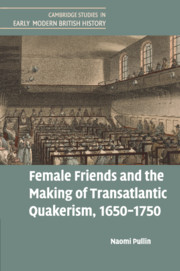Book contents
- Female Friends and the Making of Transatlantic Quakerism, 1650–1750
- Cambridge Studies in Early Modern British History
- Female Friends and the Making of Transatlantic Quakerism, 1650–1750
- Copyright page
- Dedication
- Contents
- Figures and Tables
- Acknowledgements
- Note to the Reader
- Abbreviations
- Introduction
- 1 Spiritual Housewives and Mothers in Israel: Quaker Domestic Relationships
- 2 ‘A Government of Women’: Authority and Community within the Quaker Women’s Meetings
- 3 ‘United by This Holy Cement’: The Constructions, Practices, and Experiences of Female Friendship
- 4 ‘In the World, but Not of It’: Quaker Women’s Interactions with the Non-Quaker World
- Conclusion: Quakerism Reconsidered
- Book part
- Bibliography
- Index
- References
Bibliography
Published online by Cambridge University Press: 15 May 2018
- Female Friends and the Making of Transatlantic Quakerism, 1650–1750
- Cambridge Studies in Early Modern British History
- Female Friends and the Making of Transatlantic Quakerism, 1650–1750
- Copyright page
- Dedication
- Contents
- Figures and Tables
- Acknowledgements
- Note to the Reader
- Abbreviations
- Introduction
- 1 Spiritual Housewives and Mothers in Israel: Quaker Domestic Relationships
- 2 ‘A Government of Women’: Authority and Community within the Quaker Women’s Meetings
- 3 ‘United by This Holy Cement’: The Constructions, Practices, and Experiences of Female Friendship
- 4 ‘In the World, but Not of It’: Quaker Women’s Interactions with the Non-Quaker World
- Conclusion: Quakerism Reconsidered
- Book part
- Bibliography
- Index
- References
- Type
- Chapter
- Information
- Publisher: Cambridge University PressPrint publication year: 2018



